Protests In Iran Spread To Several Cities Thursday Evening
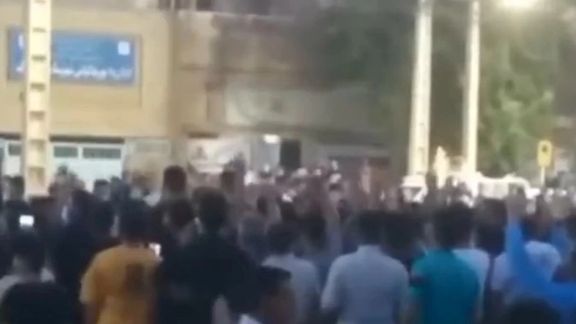
Protests triggered by rising food prices in Iran spread to several regions and cities Thursday evening, as people chanted anti-government slogans and lit fires.

Protests triggered by rising food prices in Iran spread to several regions and cities Thursday evening, as people chanted anti-government slogans and lit fires.
Early reports and some video evidence shows security forces used force in some instances against peaceful protesters marching in the streets and chanting against rising prices and government leaders. In some instances sound of firing tear gas and weapons is heard in videos shared by citizens.
Protesters in Shahre-Kord shouted slogans against President Ebrahim Raisi and voiced solidarity with the people of Khuzestan. They also chanted praises for Reza Shah, the founder of the Pahlavi Dynasty and the leader who began modernization in Iran almost a century ago.
Reza Shah’s grandson, exiled Prince Reza Pahlavi has issued a statement supporting the protesters.
In Andimeshk, Dorood, Izeh and elsewhere protesters shouted slogans against the Supreme Leader Ali Khamenei and other senior officials.
Pundits in Iran predicted the unrest in the past one week as prices suddenly jumped. Some have said that if nationwide protests start, they will be much more intense than in November 2019 when security forces were ordered to fire on protesters killing at least 1,500 people.
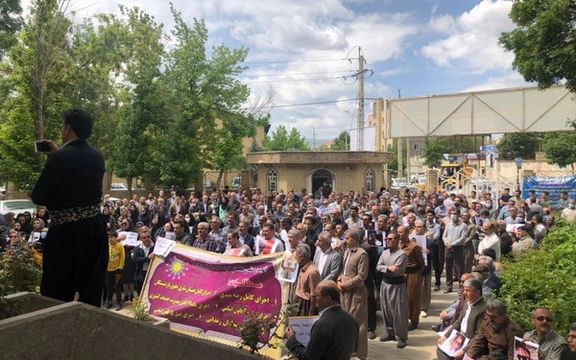
As teachers protested across Iran amid government allegations of foreign influence in their campaign, France Thursday condemned the arrest of two French citizens.
France’s Ministry for Europe and Foreign Affairs told Iran International in a communiqué Thursday it had summoned the Iranian charge d'affaires in Paris after Iran detained two French nationals on charges that they fomented teachers’ demonstrations. The ministry said the ambassador in Tehran had requested consular access to the detainees.
The Iranian Intelligence Ministry claimed Wednesday that the two had met with members of the Coordination Council of Iranian Teachers’ Trade Associations, which has organized nation-wide teachers’ protests since last year. Iran International Wednesday named those arrested as Cécile Kohler, head of the biggest federation of French teachers' unions, and her husband.
The couple arrived in Tehran's Imam Khomeini Airport April 29, stayed in Tehran for two days, and then went to Kashan and Esfahan. They were due to return home May 8, the day of their arrest. An intelligence ministry statement said Wednesday that the two went to Iranwith the aim of changing “popular” demand into “chaos, social disorder and destabilization of society.”
On Thursday, Iranian teachers took to streets for the third time in under two months despite the education ministry’s threat to fire them. According to videos posted to social media, teachers demanded better working conditions and the release of colleagues arrested in previous protests.
‘Reckless and cowardly’
The Coordination Council of Iranian Teachers’ Trade Associations said later in the day said that several people had been arrested after security forces used force to disperse the protesters in some cities, including Ahvaz, Khuzestan province, which Wednesday saw protests over increased food prices.
In a resolution published at the end of the Thursday’s rallies, protesting teachers condemned a "reckless and cowardly” attempt to attribute “decades” of their protests to foreign hands. In Tehran, police cordoned off streets leading to parliament, where teachers had gathered in previous protests.
The protests and the arrest of French nationals occurred as Enrique Mora, the senior European Union official chairing talks to revive the 2015 Iran nuclear deal (the JCPOA, Joint Comprehensive Plan of Action), was in Tehran in an effort to restart the stalled negotiations. Republican Senator James Risch, a JCPOA opponent, said Wednesday that Iran’s detention of European nationals while Mora was in Tehran “should be the final nail in the coffin for any bad deal with Iran”.
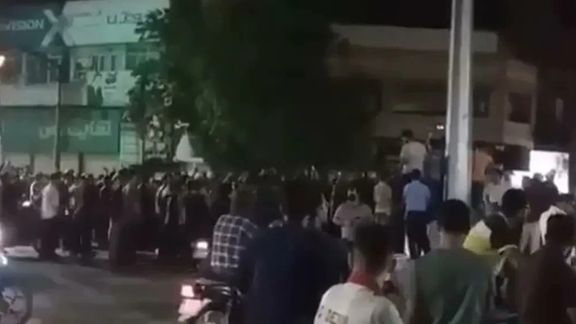
People took to the streets in several cities in southwest Iran Wednesday evening to protest a massive hike in food prices and chanted anti-government slogans.
The largest protests appear to have occurred in Dezful and there are claims on social media that people had also taken to the streets in the provincial capital Ahvaz, Izeh, and at the port city of Mahshahr.
Khuzestan Province where the protests took place is where Iran's oil fields and production are concentrated.
There are few videos of the protests amid government’s disruption of Internet access, but some videos include the narrator's statement of the date, Wednesday, and place which confirm the social media reports about protests in Dezful. In these videos protesters chant against President Ebrahim Raisi, Supreme Leader Ali Khamenei and the hike in prices.
Protesters also chanted slogans in support of the last Iranian royal family. “God bless your soul, Reza Shah,” they shouted for the founder of the Pahlavi dynasty. “King of Iran, return to Iran,” was another call aimed at the core of the Islamic Republic.
Khuzestan has been the scene of widespread protests in the past few years. Protests over water shortage in July 2021lasted for over a week during which at least eight protesters were shot dead by security forces.
A conservative lawmaker from Khuzestan, Qasem Saedi, on Wednesday warned that rising prices could trigger unrest worse than nationwide protests that rocked Iran in 2018 and 2019.
The cash-strapped government of hardliner President Raisi announced last week that it would stop paying cheap dollar for flour imports which immediately affected the price of bread and pasta. On Thursday a hike in the prices of chicken, cooking oil, and dairy products by two to threefold was also announced. Meanwhile, the Iranian rial broke the politically sensitive 300,000 threshold to the US dollar on Wednesday. It rapidly climbed to 306,000 on Thursday. Forty-five years ago, before the 1979 revolution, 70 rials bought one US dollar.
The government says it will compensate for the rise in prices of basic foodstuffs by paying cash to 90 percent of the population for the time-being, but many believe this will cause further inflation, which already stands above 40 percent.
Minister of Cooperatives, Labor, and Social Welfare Hojjat Abdolmaleki on Thursday said payment of cash will stop within a couple of months, but ration cards will be issued for lower cost food. Rationing foodstuff has been unprecedented since the Iran-Iraq War (1980-1988).
Iran's authorities often shut down or drastically slow down the Internet to prevent protesters from communicating and spreading images and videos of the protests on social media. In November 2019, NetBlocks reported a major disruption of the Internet amid nationwide protests over an increase in fuel prices.
Wednesday evening Internet access of at least one mobile carrier was completely shut down and others were seriously slowed down at the national level.
Social media users had reported disruptions in their connections in the restive province since Thursday last week in areas affected by protests over bread prices.
The international Internet freedom watchdog NetBlocks confirmed Wednesday evening that real-time network data had shown a brief collapse in international connectivity on Internet provider Rightel, as well as a deterioration on other mobile and fixed-line providers.
According to official figures published in August 2021, 94 percent of Iranians have access to mobile Internet while only around 11 percent use broadband. Authorities often reduce connection quality and speed, mainly in mobile Internet, to prevent sharing of videos and photos of protests.
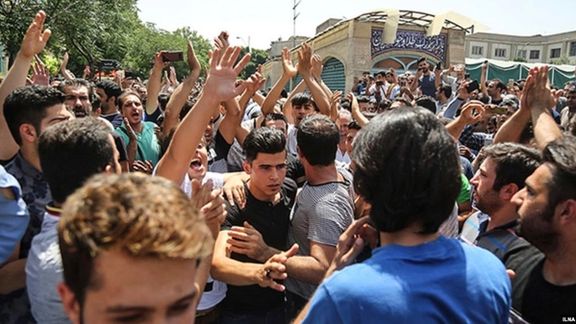
Qasem Saedi, an Iranian conservative lawmaker says rising prices can trigger new unrest worse than nationwide protests that rocked Iran in 2018 and 2019.
Moderate news website Rouydad24 quoted Saedi as saying that the current situation is more serious because the people's livelihood and bread, as the bare minimum for survival, are at stake.
Bread prices jumped last week as the government ended import subsidies for wheat and other essential commodities.
The lawmaker from Khuzestan, where intermittent protests have taken place since last week, said that never in the past 43 years since the Islamic Republic came to existence people have been so concerned about back-breaking prices. Saedi added that millions of Iranians are unable to plan for their life because wrong government policies have made any prediction impossible.
Saedi added that the people's expectations from President Ebrahim Raisi have not been met and we must now acknowledge that his economic team is weak. "It looks like they have no plans and if they had any, those plans totally ignored the interests of low-income Iranians," Saedi said.
"It no longer makes sense comparing prices to what they were in the past months. People can find out about rising prices by comparing them to yesterday's prices," he added.
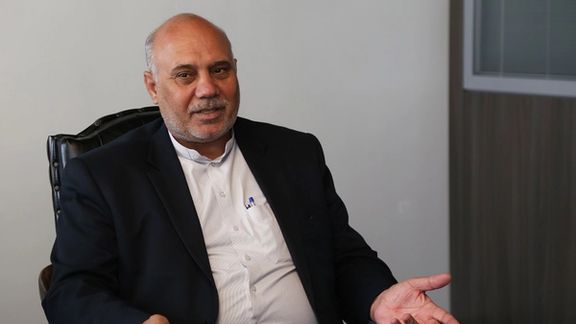
The lawmaker explained that low incomes, high inflation, and the government's inability to provide essential commodities have made life difficult for Iranians who can no longer tolerate the shortages and high prices. "This is a situation our enemies in and out of the country have always wished for," Saedi stressed.
Meanwhile, Iran Monitor website quoted former lawmaker Mansour Haghighatpoor as saying that the current parliament (Majles) shares responsibility for the failure of Raisi's government as lawmakers laid a red carpet for Raisi following his election as President in 2021, although now they do not know what to do with the government they helped rise to power.
Haghighatpoor also criticized the Majles for failing to use its supervisory tools to correct the situation. The former lawmaker obviously ignored the fact that the Majles tried on several occasion to impeach Raisi's economic ministers but the its presidium shelved the calls thanks to Supreme Leader Ali Khamenei's support for the Raisi administration that many believe is the leader's creation.
The former lawmaker pointed out that Iran's economic problems are the outcome of an undeniable mismanagement. He charged that the Majles confirmed a group of ministers but cannot supervise or correct their behavior. Haghighatpoor characterized the parliament's performance in this regard as "treason." He said not doing anything about the ministers' failures and not protecting the country's national interests is tantamount to adding insult to injury.
This comes while Iranian political commentator Hassan Beheshtipoor said in an interview with Didban Iran that besides domestic political reasons, there are also international developments that indicate Iran is going to come under further economic pressures. Beheshtipoor added that the current situation in the energy market is not going to last long and at the same time, US Congress seems to be determined to prevent a nuclear agreement between Tehran and Washington that would inevitably bring about an improvement to Iran's ailing economy.
However, like most Iranian analysts, Beheshtipoor also said that the best option for Iran is to try to find a new solution to issues hampering an agreement with the United States, as Tehran is under immense economic pressures.